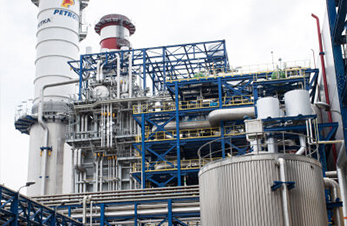Energy efficiency
As an integrated oil and gas company, OMV operates large facilities and is also a major energy consumer. The amount of energy we use creates a significant impact on the environment. Effective management of energy consumption reduces the environmental cost of our operations, increases financial savings thanks to energy efficiency, prevents non-compliance with regulatory requirements on energy use, and mitigates the climate effects of GHG emissions.
Energy efficiency measures therefore have a considerable effect on issues relating to energy consumption of interest to stakeholders:
- Governmental authorities: compliance with EU Emissions Trading System (EU ETS) regulations relating to the submission of emissions allowances within EU ETS, compliance with the EU Energy Efficiency Directive requiring greater energy efficiency in all stages of the energy value chain
- Shareholders and other stakeholders with a direct financial interest in OMV: financial savings resulting from reduced energy consumption, lower production costs, and lower GHG emissions
- NGOs/NPOs: reduced impact of our operations on the environment
The OMV Group Environmental Management Standard requires that all OMV businesses and activities use energy responsibly, conserve primary energy resources, and implement energy management plans in accordance with ISO 50001. The potential for reducing energy use is identified in annual campaigns encouraging improved environmental performance, including energy consumption. For example, we have set targets for refineries to reach certain energy index ratings through annual monitoring campaigns. Based on their energy index rating, we identify and assess areas for improvement in energy efficiency. Subsequently, we decide which measures to implement to improve energy consumption as part of our environmental governance process. (For more information on activities aimed at enhancing environmental performance as part of sustainability governance, see Sustainability governance.)
Energy efficiency activities
Energy consumption
In PJ
Energy efficiency measures in OMV operations are closely linked with technical improvements directed at reducing energy use while achieving the same operational output. Process optimization and increasing energy efficiency to save costs and reduce CO2 emissions are a strong focus of our refineries. Energy efficiency measures implemented in our three refineries in 2019 led to an annual decrease of more than 27,950 t in CO2 equivalent, and energy savings of 365 TJ. GHG reduction projects implemented in our refineries between 2009 and 2019 have so far delivered a total reduction of 0.7 mn t in CO2 equivalent.
In 2019, within the Downstream Oil division, one of our focus areas was to continue implementation of initiatives for improving GHG intensity.
The Petrobrazi refinery continued to implement measures to reduce energy consumption through programs and initiatives:
- Advanced condensate recovery and reuse
- Enhanced firing system in cogeneration plant
The above projects will result in yearly energy savings of around 34,000 GJ and over 2,000 t CO2 equivalent.
Case study: enhanced firing system in cogeneration plant

The EUR 75,000 project aimed at installing an efficient and effective technical solution to reduce steam consumption at the gas turbine firing system in the cogeneration unit. Consequently, an annual steam reduction of around 22,000 GJ was achieved, equivalent to a CO2 reduction of around 1,200 t per year.